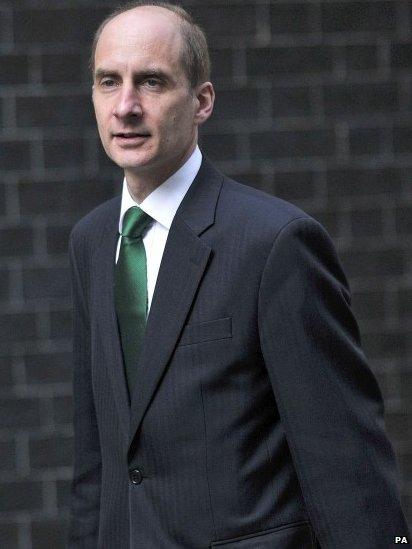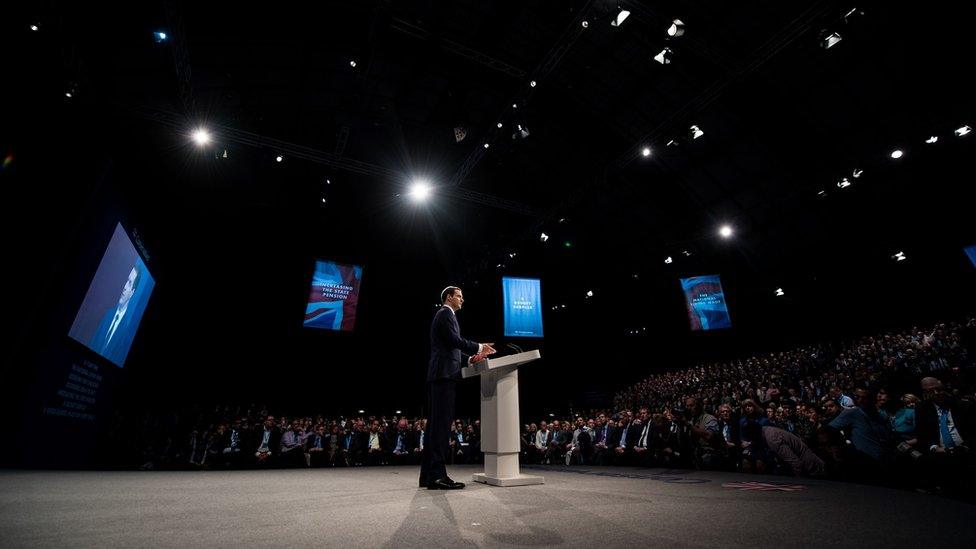Lord Adonis: The Labour peer now working for George Osborne
- Published

Andrew Adonis worked closely with Tony Blair before being a member of Gordon Brown's cabinet
"He's a moderate moderate."
It is a four word description that a friend of more than twenty years says best sums up Lord Adonis, the peer who has been appointed by the Chancellor George Osborne as the head of the new National Infrastructure Commission, external (NIC).
Andrew Adonis is not your typical politician.
His political career began as a councillor for the Social Democratic Party in the 1980s, a new outfit formed by Labour types who felt their party was drifting too far to the left.
He later became a Liberal Democrat and was selected to fight a parliamentary seat for them, before quitting and joining the Labour Party.
He became Tony Blair's head of policy, was given a seat in the House of Lords as Lord Adonis of Camden Town, and then became a schools minister and then transport secretary.
But he will now sit on the crossbenches in the House of Lords - alongside independent peers, without a party political affiliation - whilst he chairs the NIC.
'Not tribal'
It is a CV which suggests a loose affiliation to any political party, although his friends point out he remains a member of the Labour Party even though he won't be sitting with his Labour colleagues in the Upper House.
"There's an overlap between those on the left wing of the Conservative Party and those on the right wing of the Labour Party. He is right in the middle of that," his friend adds.
Others who have known him for a similar length of time reflect a similar sentiment.
"He's not a tribalist. He brings an almost unique combination into politics," Stephen Pollard, the editor of the Jewish Chronicle, explains.

Lord Adonis was the engine behind Labour's academy schools programme - later championed by both the Conservatives and Liberal Democrats
Lord Adonis was Mr Pollard's tutor at Oxford University, and the two men went on to write a book "A Class Act: The Myth of Britain's Classless Society," in 1997.
"Andrew is an academic with an academic's outlook, but with huge political and practical antennae," Stephen Pollard adds.
"He is almost unique in the combinations he brings, the political, the intellectual and being obsessed with doing things. He loves policy and delivery and has a very pragmatic approach," he says.
But his lack of tribal instinct unnerves some of his Labour colleagues.
'Chameleon'
When the Shadow Chancellor John McDonnell, probably never described by anyone as a centrist, described Lord Adonis as "a bit of a political chameleon", it didn't sound like it was meant as a compliment.
But Mr McDonnell did reflect what plenty of Lord Adonis's friends say too: "I think he just wants to get on with the job."

The 52-year old has been a member of the SDP, Lib Dems and Labour
His enthusiasm in government for giving schools freedom from local authority control, the academies programme, provoked scepticism from some Labour colleagues, but praise from his opponents.
When he became Transport Secretary in 2008 and so stopped being a schools minister, both Michael Gove for the Conservatives and David Laws for the Liberal Democrats worried that that might spell the end, or at least the watering down, of the pace of schools reform - reform that was embraced and then turbo charged when Mr Gove and Mr Laws became education secretary and education minister respectively in the coalition government.
"He is the most effective minister I ever worked with," Lord Knight, a former Labour education minister says.
"He is very effective at getting things delivered. He is the right appointment for this job. This Commission was Labour's idea in the first place, so he would have been a great candidate to do the job if we had been elected too," he added.
Labour idea
And yes, it is not just Lord Adonis who is comfortable with an element of political cross dressing.
The man who has given him his new job, the Chancellor George Osborne, is too - swiping the idea of the National Infrastructure Commission from page 19 of Labour's election manifesto.
"We will set up an independent National Infrastructure Commission to assess how best to meet Britain's infrastructure needs," it read.
Having been announced as the chair of the new Commission at the start of the Conservative Party Conference - an announcement the timing of which is dripping in politics - Lord Adonis has decided to stay away from the cameras this week as best he can, and not give any interviews.
But his friends sum up what motivates him.
"I think Andrew found the period when the coalition government was in power very frustrating," Stephen Pollard says.
"He wanted to do something to help and probably thought it was pretty centrist, and he could work with it, but, as a Labour peer, he couldn't."
But now, he has found a way to do what his admirers say he does best - get stuck into the detail, and try to get things done, even if Labour are in opposition.
- Published5 October 2015

- Published5 October 2015
